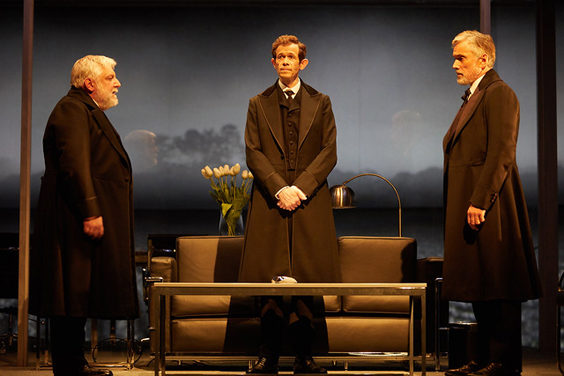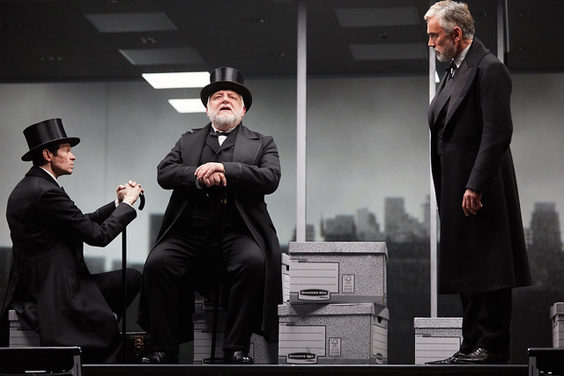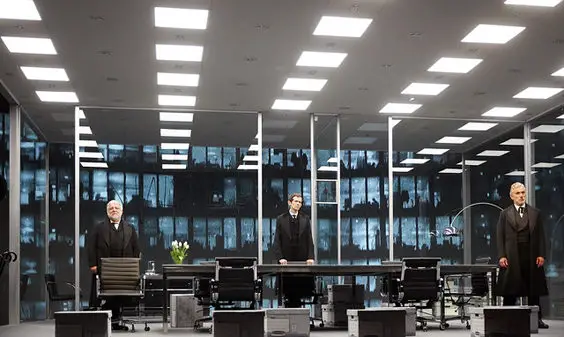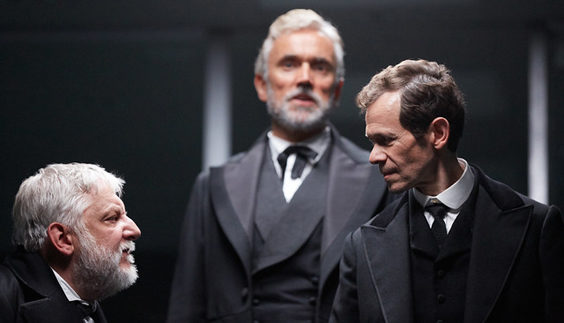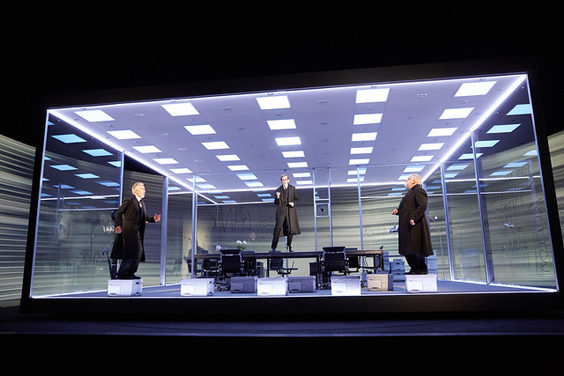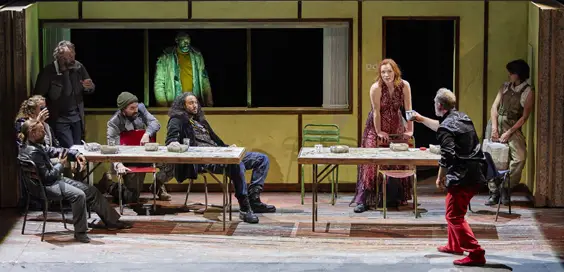The Lehman Trilogy (National Theatre) – Review – Showcase Cinema de Luxe, Leeds (Satellite Screening)
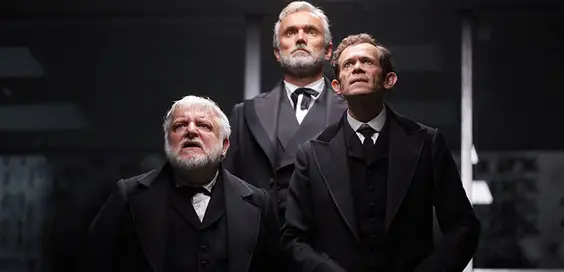
By Eve Luddington, July 2019
In London’s Piccadilly Theatre, the theatre audience were frantically fanning themselves with their programmes on one of the hottest evenings ever recorded in the UK. I was relieved to be enjoying the live-streaming from the air-conditioned comfort of Leeds Showcase Deluxe. Fortunately, the three actors, who played all the parts between them, showed no signs of wilting and gave us a tour de force performance.
The Lehman Trilogy was, originally, a 9-hour radio play by the Italian writer, Stefano Massini, who adapted it himself into a 5-hour theatre piece. British director Sam Mendes was given a luxurious three years by the National Theatre to choose a creative team, a theatrical form and to develop an English version. Mendes says of the play that resulted: ‘It’s really about three men in a box trying to conjure up 160 years.’
He’s right. The three men – Simon Russell Beale, Adam Godley and Ben Miles – are the remarkably fine actors; the box is a rotating glass structure furnished as an office and set against video projections on the back wall – and 160 years, the time frame. Together, all the components make for first-rate theatre for people who enjoy good storytelling as much as a good story.
“Mood-enhancing visual aids”
The Lehman Trilogy traces the Lehman Brothers’ banking firm from its humble beginnings in the 1840s to its collapse, in September 2008, as a company employing 25,000 workers. At the time, its bankruptcy was the largest in history, and it contributed to the global financial crash of that year.
Ben Powers’ three Act script interweaves narration and action. It’s packed with historical and financial information but is never dry because the language is so evocative; full of rich, poetic vocabulary. The main characters are neatly summed up by catch phrases which become ‘in’ jokes with the audience. There’s an accompanying piano score, played live by Candida Caldicot, which enhances the rhythm and pace, and gives a commentary sometimes reminiscent of silent movie music. Es Devlin’s crisply effective glass box and Luke Halls’ video projection are mainly monochrome: they serve well as non-imposing but mood-enhancing visual aids to the storytelling.
“Wry delivery”
With such strong material and stage design, Mendes and his actors have a great opportunity to make inspired storytelling theatre, and they’ve seized it with relish. The hugely talented actors switch instantly between roles using only their bodies and voices, plus the occasional pair of specs: watching them is a delight in itself and adds to the wit of the production. Their physicality and acting styles are highly individualistic; the trust between them unites them as a cast.
Part One, ‘Three Brothers’, starts with a radio announcement marking the imminent failure of the banks in 2008. Then we move to 1844. Simon Russell Beale’s directness and wry delivery immediately engage us as he narrates his first character’s journey from Bavaria in Germany to his ‘promised land’, America. Hyam Lehman, the oldest of three German Jewish brothers, begins his sea crossing from Europe as an innocent. By the time he ‘step(s) into that magical music box called America’ 45 days later, he’s learned about drink and gambling, and quickly discovers enough about his new country to hastily rename himself Henry. Beale plays him as a man with his feet on the ground, attached to his European Jewish roots but determined to make a better life for himself in America.
“Entirely credible”
Henry’s first business venture, in Montgomery Alabama, is a fabric shop which makes $2.70 a day. When they join him from Germany, his second brother, Emmanuel (Ben Miles) and his youngest, Mayer (Adam Godley), share his adherence to Jewish traditions and superstition but bring their own business ideas with them.
The actors’ relationship as brothers is entirely credible, but they slot effortlessly into cameo parts of all sorts and different genders. Beale and Godley, in particular, have multiple role changes. Ben Miles is very strong as the ambitious, rather chilly Emmanuel but equally effective as a young lad of six and some hot-headed businessmen.
The Lehmans become ‘middlemen’ instead of shopkeepers, trading cotton, and then, in a clever move which ensures their survival after the American Civil War, they borrow money to invest it. They no longer handle materials, just money. The first Act ends as the immigrant brothers move up, to New York.
“Amoral smooth-talker”
Part Two, ‘Fathers and Sons’, begins as the brothers declare their company a bank. Emmanuel’s son, Philip – the first Lehman born in America – takes control. He is played, by Beale, with great focus as a single-minded strategist with time only to pay lip service to Jewish traditions. He turns even a recurrent nightmare into a business opportunity and chooses his wife on a points system. All the suitors, and there are about 10 of them, are portrayed with staggering ingenuity by Adam Godley.
Philip takes the company into the newly formed Stock Exchange where it becomes the largest Wall Street Corporation. Act Two ends on a dramatic low, with the Wall Street crash of 1929. As the video projection of New York skyscrapers darkens the sky and closes in on the office in Part Three, ‘The Immortal’, Philip’s son Bobbie takes charge. Adam Godley’s physical embodiment of this cultured, amoral smooth-talker is cringeworthy. Bobbie’s religion is not Judaism but making money for the sake of money-making and power.
“Vivid”
Mendes’ direction is all about bringing the theatrical elements together to tell the story effectively and he does so simply and superbly, with no gimmicks but full and appropriate use of his magnificent creative team and attention to important detail. We see the main characters as human beings while also acknowledging them as representatives of Western capitalist society, eventually driven beyond humane considerations in their pursuit of wealth. In the last Act, with the back wall projection covered in Stock Market figures, he ratchets up the pace to dizzy heights reflecting the relentless momentum of the monstrous machine that the Lehman Brothers Corporation and the stock markets have become.
I knew little about the Lehman Brothers Corporation before I saw the play. I know a lot more now, of course, and have vivid impressions of the family members as they were depicted. But two things struck me most about this excellent production; firstly, the way this history of an immigrant family mirrored the passage of capitalism between the 19th and 21st centuries as greed obliterated sight of human needs, and secondly, the simple, striking way a brilliant team of creatives told the story.
images: Mark Douet
